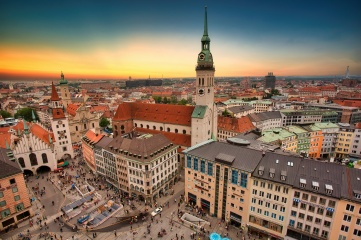Residents of Munich have backed the city's bid to host the Olympic Games by two thirds, giving the green light to bring the Summer Games to Bavaria in 2036, 2040 or 2044.
A referendum found 66.4 percent of voters supported the measure, which means the city remains in the fight to become the chosen host city of the German Olympic Sports Confederation (DOSB), who look set to bid for the 2036 event. Capital city Berlin is also in contention, alongside Hamburg and the Rhine-Ruhr region - which hosted the 2025 FISU Summer World University Games.
Hamburg and Rhine-Ruhr are expected to follow Munich in hosting local referendums, while Berlin has no plans to do so. Berlin's bid also survived a potential collapse when the city's Sports Minister, Iris Spranger, kept her position following a no-confidence vote in the House of Representatives. This was motioned by the Green Party and The Left, two of the major political parties on the centre-left and left respectively. Spranger, representing the centre-left Social Democratic Party, remains in place after being supported by her party and their coalition partners, the conservative Christian Democratic Union. This vote took place after concerns over correct procedures related to transparency over public funds.
Hamburg had aimed to bid for the 2024 Summer Olympics, which went to Paris, but a referendum found 51.6 percent of the population rejected the proposal.
Munich's referendum was the highest of its kind compared to other sporting questions. 42 percent of the eligible electorate participated, a higher turnout than the previous turnout record of 37.5 percent for the referendum held in 2001 to approve the construction of the Allianz Arena, the future home of football club Bayern Munich.
Munich Mayor, Dieter Reiter, expressed his delight following the result stating: "This result is far more than a yes to the Olympics. It is a yes to bold, sustainable, and inclusive urban development."
In 2013, the city's residents rejected a proposed bid for the 2022 Winter Olympic Games - which would have made it the first city to host the Summer and Winter editions. This was instead won by Beijing, who became the first city to host both.
2036 would be a notable landmark for a German bid - coming 100 years after the Berlin 1936 Olympic Games, which is considered to be a shameful mark in sporting history, hosted under the regime of Nazi Germany. For the Bavarian city, it will also be an opportunity to revisit their past and have a second chance. The Munich 1972 Games are remembered for the kidnapping and murder of 11 Israeli Olympic team members and one police officer by the militant organisation Black September. The decision for the Games to continue afterwards remains controversial today.
While Germany is expected to bid for the 2036 Olympic Games, an official bid will not be launched until the DOSB confirm its candidate city in late 2026. Ahmedabad, India, is the latest city to bid for the event, joining Qatar's capital city Doha, Turkish city Istanbul and Santiago, the capital city of Chile.


